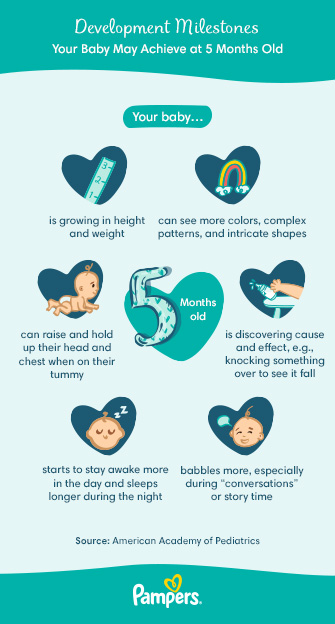
Caring for a 5-Month-Old Baby: A Comprehensive Guide
The arrival of a 5-month-old baby marks a significant milestone in a parent’s journey. This is a time of rapid growth and development, both physically and cognitively. As your little one transitions from a newborn to an active and curious infant, it’s essential to provide them with the optimal care and support to ensure their well-being and foster their development.
Feeding
At 5 months, most babies are exclusively breastfed or formula-fed. Breast milk or formula should continue to be the primary source of nutrition, providing essential nutrients and antibodies. The recommended feeding schedule varies depending on the baby’s individual needs, but typically involves 6-8 feedings per day.
- Breastfeeding: Continue to breastfeed on demand, allowing the baby to nurse for as long as they desire. Monitor the baby’s cues, such as rooting, sucking motions, or hunger cries, to determine when they need to feed.
- Formula-feeding: Follow the instructions on the formula container for proper preparation and feeding amounts. Use a clean bottle and nipple, and warm the formula to room temperature before feeding.
Sleep
At 5 months, babies typically sleep for 12-15 hours per day, with naps throughout the day. Establishing a regular sleep schedule can help regulate the baby’s circadian rhythm and promote restful sleep.
- Daytime naps: Most babies take 3-4 naps per day, each lasting around 1-2 hours. Create a conducive sleep environment by darkening the room, using white noise, and swaddling the baby.
- Nighttime sleep: Aim for 10-12 hours of uninterrupted sleep at night. Establish a consistent bedtime routine, such as a warm bath, massage, and feeding.
Diapering
Diaper changes are frequent at this age, with most babies requiring 6-8 diaper changes per day. Use gentle wipes and diaper cream to prevent diaper rash.
- Wet diapers: Change wet diapers immediately to keep the baby dry and comfortable.
- Soiled diapers: Clean the baby’s bottom thoroughly and apply diaper cream to prevent irritation.
Bathing
Bathing a 5-month-old baby 2-3 times per week is sufficient. Use lukewarm water and a gentle baby soap. Avoid using harsh soaps or detergents that can irritate the baby’s skin.
- Sponge baths: For newborns, sponge baths are recommended until the umbilical cord falls off. Use a soft sponge and warm water to gently clean the baby’s body.
- Tub baths: Once the umbilical cord falls off, you can transition to tub baths. Fill the tub with 2-3 inches of lukewarm water and use a baby washcloth to gently wash the baby’s body.
Health and Safety
Monitoring your baby’s health and ensuring their safety is paramount. Regular checkups with the pediatrician are essential to track growth and development and address any concerns.
- Immunizations: At 5 months, babies typically receive vaccinations for diphtheria, tetanus, pertussis (whooping cough), Haemophilus influenzae type b (Hib), and polio.
- Tummy time: Encourage tummy time for at least 30 minutes per day to strengthen the baby’s neck and back muscles. Supervise the baby closely during tummy time.
- Car seat safety: Always use a rear-facing car seat when transporting the baby in a vehicle. Ensure the car seat is properly installed and the baby is securely buckled in.
Cognitive and Social Development
At 5 months, babies are becoming increasingly aware of their surroundings and interacting with their environment. They are developing social skills, such as smiling, cooing, and reaching out to others.
- Play and stimulation: Engage the baby in interactive play, such as peek-a-boo, singing songs, and reading books. Provide toys that encourage exploration and sensory development.
- Social interaction: Talk to the baby frequently, using a soothing and gentle tone. Respond to their coos and smiles to foster social bonding.
- Cognitive development: Encourage the baby’s cognitive development by providing them with opportunities to explore different textures, shapes, and sounds.
Common Concerns
As a parent of a 5-month-old baby, it’s normal to have concerns about their well-being. Here are some common concerns and how to address them:
- Colic: Colic is a condition characterized by excessive crying and fussiness in babies. If your baby is experiencing colic, try gentle massage, warm baths, or over-the-counter gas drops.
- Teething: Teething can cause discomfort and irritability in babies. Offer teething toys or a cold washcloth to chew on to soothe their gums.
- Sleep regression: Sleep regression is a temporary disruption in a baby’s sleep patterns. It can be caused by various factors, such as teething, developmental milestones, or changes in routine. Be patient and consistent with your sleep schedule, and consult with your pediatrician if the sleep regression persists.
Conclusion
Caring for a 5-month-old baby is a rewarding and challenging experience. By providing them with optimal nutrition, sleep, hygiene, health care, and cognitive stimulation, you can support their growth and development and foster a strong and loving bond. Remember to trust your instincts as a parent and consult with your pediatrician for guidance and support whenever needed.
